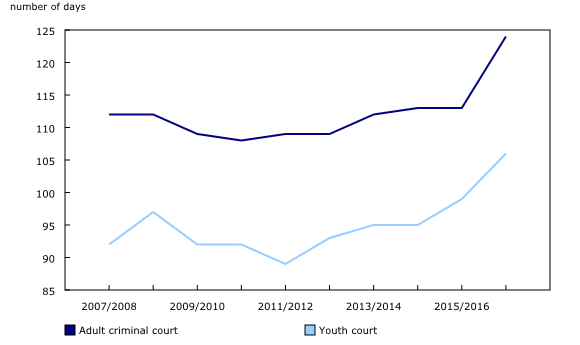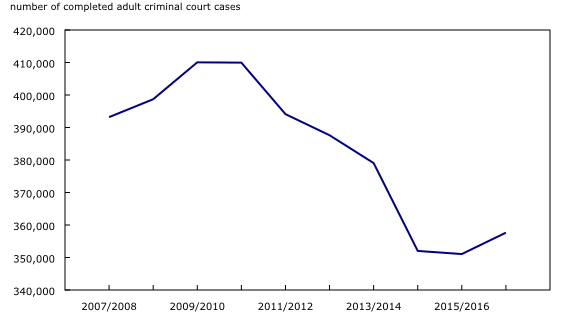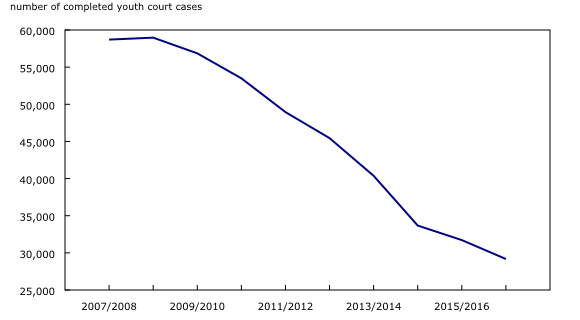Adult criminal and youth court statistics in Canada, 2016/2017
Archived Content
Information identified as archived is provided for reference, research or recordkeeping purposes. It is not subject to the Government of Canada Web Standards and has not been altered or updated since it was archived. Please "contact us" to request a format other than those available.
Released: 2019-01-24
In Canada, under the Charter of Rights and Freedoms, individuals are granted the right to a speedy trial. As such, monitoring the time it takes for criminal charges to progress through court is critical to our understanding of how well this right is being respected. Charges took longer to complete in both adult criminal and youth courts in Canada in 2016/2017, while there was also an increase in the average number of charges per court case.
Detailed information is provided in the Juristat article, "Adult criminal and youth court statistics in Canada, 2016/2017," released today. It presents data on the number of cases and charges completed in adult criminal and youth courts in Canada, as well as the characteristics of those cases and charges. The information in this article is taken from the Integrated Criminal Court Survey (ICCS), which collects administrative data from the provincial and territorial departments responsible for criminal courts in Canada.
A court case combines all charges against an accused that were processed by the courts at the same time and received a final decision. In July 2016, the Supreme Court of Canada's Jordan decision set limits on the length of time that is acceptable for processing criminal charges.
The characteristics of cases and charges in adult criminal court differ from those in youth court. In Canada, adult criminal courts operate parallel to, but separate from, youth courts. Youth courts, in turn, are guided by the Youth Criminal Justice Act (YCJA), which aims to divert youth offenders involved in less serious crimes out of the formal criminal court system. The YCJA also requires that all reasonable alternatives to custody be considered.
Time to complete a charge increased in years prior to the Jordan decision
Although adult criminal court cases differ from youth court cases in many respects, one of the similarities between them is that it has taken longer to complete charges in recent years.
The median length of time taken to complete both an adult criminal and a youth court charge increased from 2015/2016 to 2016/2017. In adult criminal court, the median rose 10% to 124 days. In youth court, the median increased 7% to 106 days.
Charges completed in 2016/2017 took a median of 12 days longer than they did in 2007/2008 in adult criminal court and 14 days longer in youth court.
Among the provinces and territories in 2016/2017, Quebec had the longest median charge processing time in adult criminal court (167 days), while Prince Edward Island had the shortest (36 days). The median for Quebec has been adjusted to account for missing municipal court data, where less serious charges are typically heard and generally take less time to process compared with other levels of court. Quebec is the only province or territory where criminal charges are heard in municipal court.
Six of the provinces and territories that recorded an increase in charge processing time in 2016/2017 (Newfoundland and Labrador, Quebec, Ontario, Alberta, British Columbia, and Nunavut) also saw an increase in the number of court cases that were completed, possibly the result of the completion of older cases that were pending in the system.
In youth court, Ontario and Yukon had the longest charge processing times (134 days), while Prince Edward Island had the shortest (29 days).
Number of cases completed in adult criminal court increases for the first time in seven years
There were nearly 358,000 cases, involving more than 1.2 million charges, completed in adult criminal court in Canada in 2016/2017. In youth court, there were over 29,000 cases, involving in excess of 110,000 charges, completed in the same year.
The number of cases completed in adult criminal court was 2% higher than the previous year. In contrast, the number of completed youth court cases continued to decline in 2016/2017. In general, these results follow the trends seen over the past decade in police-reported crime for adults and youth.
Both adult criminal and youth courts completed fewer cases in 2016/2017 than they did a decade earlier. The decline in completed youth court cases has been consistent year over year since 2008/2009, while the decrease has not been as uniform in adult criminal court.
Six provinces and territories recorded an increase in the number of completed cases in adult criminal court in 2016/2017 compared with the previous year. Quebec (+9%) and Newfoundland and Labrador (+3%) reported the largest increases. In contrast, seven jurisdictions saw decreases, with the largest declines in the Northwest Territories (-17%) and Yukon (-14%). In youth court, every province and territory except Nunavut (+22%) reported a decline in the number of completed cases.
Average number of charges and appearances in a case continues to increase
Over the past decade, both adult criminal and youth court cases have shown a trend towards longer, more complex cases, involving more charges and appearances per case. The average number of charges in youth court cases grew from 3.3 in 2007/2008 to 3.9 in 2016/2017. Over the same period in adult criminal court, the number increased from 2.9 to 3.4.
Similarly, the average number of appearances per case in adult criminal court increased from 6.7 in 2007/2008 to 7.7 in 2016/2017. In youth court, the average rose from 5.6 appearances per case in 2007/2008 to 7.0 in 2016/2017.
In 2016/2017, five offence types accounted for nearly half of the criminal court case volume in Canada. In adult criminal court, theft, impaired driving, failure to comply with a court order, common assault and breach of probation represented 47% of all completed cases. In youth court, theft, offences under the YCJA (most of which tend to be related to administration of justice), common assault, break and enter, and major assault represented 44% of all completed cases.
More than half of cases result in a guilty verdict
Over half (54%) of youth court cases resulted in a guilty verdict in 2016/2017. At the same time, close to two-thirds (63%) of cases in adult criminal court resulted in a guilty verdict.
About one-third (32%) of cases in adult criminal court resulted in a stay or withdrawal in 2016/2017, compared with 44% of cases in youth court.
Acquittals and other decision types were less frequent. They represented 5% of decisions in adult criminal court cases and 2% of decisions in youth court cases.
Cases can receive more than one type of sentence. The most serious type of sentence is custody, which was imposed in 38% of adult criminal court cases with a guilty verdict in 2016/2017. In contrast, the YCJA requires that all reasonable alternatives to custody are considered and, as a result, a custodial sentence was imposed in one in eight (13%) guilty youth court cases. The median length of a custodial sentence was 30 days in adult criminal court and 50 days in youth court. This is in line with the principle of custody being reserved for the most serious crimes in youth court cases, which are the ones that will draw the longest sentences.
Probation was the most common type of sentence imposed in both adult criminal and youth court cases.
Note to readers
The data presented in this article are drawn from both the adult portion (individuals 18 years and older) and youth portion (individuals aged 12 to 17 years) of the Integrated Criminal Court Survey (ICCS).
The ICCS collects administrative records of court appearances from the provincial and territorial departments responsible for criminal courts in Canada. Data are collected from all court levels (municipal, provincial and superior) for both adult criminal and youth courts. A fiscal year of data (April 1 to March 31) is collected each year and is typically received within three months after the end of the fiscal year. The data are processed into completed cases and charges, and go through a comprehensive editing and verification process which can take several months to complete. Prior to being released, data sign-off packages are produced for each jurisdiction and are formally signed-off on by them; this sign off usually takes one to two months. A close collaboration with jurisdictions ensures high quality data.
The statistical trends presented in this report reflect, among other things, the progress made by the federal, provincial and territorial governments in establishing and implementing a variety of practices and initiatives to improve the efficiency of the Canadian justice system. These initiatives influence the volume of cases and the processing of those cases before the courts. It is impossible to identify a specific initiative as the source of the changes observed in the statistical trends; rather, the trends reflect the cumulative impact of these initiatives.
Adult criminal and youth court cases that involve more than one charge are represented by the most serious offence. A completed case is defined as one or more charges against an accused person or company that were processed by the courts at the same time and received a final decision.
In 2016/2017, information was unavailable from superior courts in Prince Edward Island, Ontario, Manitoba and Saskatchewan as well as municipal courts in Quebec. Superior court data reported to the survey in 2016/2017 represented about 1% of all completed adult criminal court cases.
A follow-up Juristat article will be released in 2019 that will focus on charge processing times using the most up-to-date ICCS data. The article will expand upon the time processing analysis presented here and will introduce new indicators. Also, this will represent the first full-year of ICCS data post-Jordan decision.
Products
The article "Adult criminal and youth court statistics in Canada, 2016/2017" is now available as part of the publication Juristat (85-002-X).
Additional data are available upon request.
Contact information
For more information, or to enquire about the concepts, methods or data quality of this release, contact us (toll-free 1-800-263-1136; 514-283-8300; STATCAN.infostats-infostats.STATCAN@canada.ca) or Media Relations (613-951-4636; STATCAN.mediahotline-ligneinfomedias.STATCAN@canada.ca).
- Date modified:





